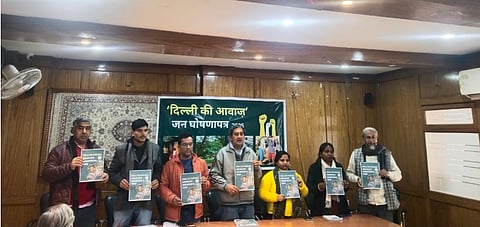
New Delhi- In an unprecedented move towards inclusive governance, the "Dilli Ki Awaaz People's Manifesto 2025" has emerged as a collaborative effort to represent the voices of Delhi's diverse communities. The manifesto envisions a future addressing affordable housing, sustainable infrastructure, and pressing environmental challenges such as air pollution, the climate crisis, water scarcity, and urban flooding.
The manifesto was revealed in a press meet at the Press Club of India on Friday by the Dilli ki Awaaz team.
"The vision of Dilli Ki Awaaz – People's Manifesto 2025 reflects the aspirations of those often excluded from policymaking, including working-class communities, informal workers, youth, women, children, LGBTQIA++ individuals, and climate activists," stated Soumya Dutta, a senior member of the National Alliance of People's Movement. "We are in the process of giving this manifesto document to all political parties contesting elections in Delhi."
Highlighting Delhi's severe air pollution crisis, the manifesto proposes urgent measures such as transitioning to cleaner fuels, phasing out private diesel vehicles, and ending diesel subsidies. It also calls for a moratorium on new waste-to-energy plants and phasing out existing waste incineration plants. "Air pollution in Delhi is at crisis levels, causing respiratory diseases, heart conditions, and premature deaths, especially among children, the elderly, and vulnerable communities," said Neelam Ahluwalia from People for Aravallis.
For effective waste management, the manifesto emphasizes enforcing the Solid Waste Management Rules, 2016. It advocates for decentralized segregation, collection, and processing of waste, along with establishing ward-level recycling centres managed by waste picker cooperatives. "We must recognize informal waste workers by providing them with ID cards, safety equipment, and health checks," stated Azim, a waste picker associated with Delhi Round Table and Lokadhikar.
To safeguard the incomes of marginalized workers during heatwaves, pollution days, and climate disasters, the manifesto proposes compensation plans for lost workdays and mapping high-risk work areas. "Integrating heatwave action plans with health and medical systems is crucial," said Aravind Unni, an urban researcher and practitioner.
The manifesto strongly opposes forced evictions and prioritizes in-situ rehabilitation with secure tenure and freehold rights for slum residents. "A ward-wise census of the homeless is essential to address vulnerabilities based on age, gender, disability, and family status," stated Meenakshi of Humse Hai Dilli.
Proposals to improve public transport include expanding Delhi’s bus fleet to 12,000 electric and CNG buses by 2025-26 and providing free or subsidized fares for marginalized groups. Vaishali from Greenpeace India said, "The manifesto also proposes reintroducing the Bus Rapid Transit (BRT) system, expanding last-mile connectivity with feeder buses, shared auto-rickshaws, and bike-sharing systems, while promoting car-free zones to reduce congestion."
The manifesto highlights the implementation of the Street Vendors Act, 2014, and advocates for shaded kiosks, sanitation, and secure storage facilities for street vendors.
“Implement the Street Vendors Act, 2014, by completing the partial and incomplete survey to correct the certification of vending issued, ensuring designated vending zones, fair representation in Town Vending Committees, and protection from harassment. Provide shaded kiosks, sanitation and secure storage facilities. Offer financial assistance, training in hygiene and digital payments, and partnerships for broader market access. Strengthen grievance redressal mechanisms and support women entrepreneurs with dedicated spaces,” mentioned Anil Bakshi, Street Vendors Leader.
For domestic workers, the document seeks legal recognition, minimum wages, and social security benefits. “Establish formal agreements for accountability, helplines for redressal and skill development programs. Promote union formation and subsidized childcare facilities. Conduct inspections to improve working conditions and provide affordable housing options,” stated Jaya, Delhi Gharelu Kamgar Sanghtan (DKGS).
Recognizing gig workers as formal laborers with defined rights is another focal point.“Recognize gig workers as formal laborers with defined rights. Ensure minimum wages, transparent algorithms and social security benefits. Develop grievance mechanisms and access to financial services. Provide mental health support, training for skill diversification, and promote collective bargaining. Introduce portable benefits to enhance stability and fair treatment,” said Md Mukhtar Alam, Gig Workers Association (GIGWA).
To improve Delhi’s green cover, the manifesto suggests planting native species, creating urban forests in underserved areas, and protecting natural ecosystems such as forests, wetlands, lakes, and water bodies. “Improve Delhi’s green cover by planting native and locally useful species to replace exotic invasive species like ‘Vilayati kikar’ etc, which have spread all across, create urban forests in underserved areas to improve biodiversity and reduce urban heat build-up, restore and protect all forests, wetlands, lakes, and water bodies to enhance natural ecosystems, reduce flooding and promote groundwater recharge and declare the Yamuna floodplain as a no-development zone,” stated Tannuja Chauhan from Save Dwarka Forest group.
Highlighting the lack of youth participation, Vijay Sehrawat from Youth for Climate India said, "There is not even a youth policy at the state level. Central to the 'Dilli Ki Awaaz' campaign is the commitment that citizens will continue to engage with our elected leaders even after the elections in the spirit of participatory governance."
The "Dilli Ki Awaaz People's Manifesto 2025" is both a blueprint for policy change and a call to action. It underscores the necessity of collaboration among citizens, policymakers, and stakeholders to transform Delhi into a more inclusive, sustainable, and equitable city.
You can also join our WhatsApp group to get premium and selected news of The Mooknayak on WhatsApp. Click here to join the WhatsApp group.